The Story Of Your First Cigarette
How old were you? Why did you do it?

Matt Moore, at age 25
I was “straight edge” until I was over 21, but hadn’t dabbled in smoking, mainly because I was a former college runner and smoking was such a big no-no for that. At this time, I was two years into living in Los Angeles, and my best friend was a recruiter for an MTV reality show. So, I started meeting a bunch of “cool” young professionals. There was a certain group who had ultra-hip parties in Los Feliz, and over time, I became smitten with a girl there. She was beautiful, and hip, and smoked, at least when she partied. As she started taking a liking to me, I felt my anti-smoking grip ease. One night, this girl breaks open a pack of cigarettes and I asked if I could have one. But man, I am not good at smoking. I didn’t — and still don’t — really know how to inhale. I did that thing where you take it into your mouth, hold it for a few seconds, and blow it back out. I decided to keep doing it as a habit, in hopes of remaining cool, but never got the hang of it. I became a cigarette mule for the “cool guys” who knew I always had cigarettes, since I didn’t really try to smoke unless I was around the girl. This lasted two weeks. During that time, the girl and I finally had a moment and we passionately kissed. Then I didn’t see her for a week, and when I asked her friend what happened, she said, “Oh yeah, she’s gay now.” I quit smoking after that.
Leigh, at age 4
My sister and I must have expressed some sort of intrigue around the little cancer sticks, since both our parents were smokers. My dad would smoke American Spirits in the car with us, and I can’t tell you how many times his ash would fly back onto me in the back seat. Memories with cigs run deep in my family. So, one afternoon, not long after my parents divorced, my mom was annoyed by us asking about cigarettes, so she said, “Fine! You want one, here.” And she lit up a cigarette for us to share. We both took one drag and coughed horribly, both right on the verge of puking. It tasted so nasty, and I’ve never touched one again. I guess this was one of those parenting gambles that probably doesn’t happen too much nowadays, but flew by in late-80s Chicago.

Michelle Novak, at age 17
I want to say I was at Nitro, a weird 17-and-over dance club. Maybe not inside, since I don’t know if that was possible, so probably in the parking lot. I was out with some girls and being “rebellious.” In all other respects, I was the antithesis of rebellious. A “good kid,” as they’d say. Smoking wasn’t foreign to me, I had several family members that smoked. I remember society not stigmatized at the time, but turning. I think I’m the last generation that can remember walking to the corner store at age 10 and buying grandma a pack because I had a note. So, we were at Nitro and Missy Sanderson gave me the cigarette, a Newport Light. She was a friend of my friend, I want to say an inner city South Side of Chicago, Catholic school girl. I don’t recall coughing, although I’m pretty positive I didn’t completely inhale. The next morning, due to spending the night at Missy’s house, I tried again and this time I inhaled.
Ryan, at age 16
My friends and I would smoke a cigar at band practice — Swisher Sweet, Black and Mild, stuff like that. We moved onto clove cigarettes, but cigarettes felt like the final taboo. The line you toe, but that, to cross, would be disastrous. I was as prone to anti-smoking propaganda as anyone else my age at the time, but like any teenager, it also seemed cool. Rebellious, counter-culture. I was a punk gradually phasing into a greaser, so it suited the aesthetic. I got the cigarette from my younger cousin, who was openly a smoker, much to the chagrin of his immediate family. He’d already had issues around drinking, drugs, and the law, and was, as such, cooler than I was. It was probably the day after Christmas, and it was on the Mission Beach Boardwalk in San Diego. He and I were close and would usually break from the rest of our family to hang out. I have no memory of what prompted me to ask for a drag. I never planned to smoke or was trying to get past a fear or anything. Maybe it was just opportunistic. I only had a few drags, but it felt like I was doing the worst possible thing, and thought I instantly was addicted and had cancer.
Andrea Martinez, at age 15
Traci and I went to Joey’s and asked him to buy us weed, although we’d never smoked it, and didn’t even know if we really wanted it. He left on his moped and left us waiting outside, so we decided to break in and steal a pack of cigarettes. They were Basics that his mom bought him. We stole them and ran back to our friend Lisa’s, and we lit them up in the loft above her parents garage. The whole place filled with smoke. We spent the afternoon walking to the mall — via the woods, the back way — and chain-smoking and singing Beastie Boys songs. For a while after that, we had our friends buy us cigarettes until we found the stores that’d sell to us. This was in Michigan.

Alexandra, at age 14
I was totally sober, alone, and at my house in Venezuela. I’d been very curious about it for a while. I didn’t want to be around other people because I knew I would underperform, so I had to practice. My dad, who doesn’t smoke, had a shelf where he put souvenir cigarette packs. It happened to be too big, so there was a Marlboro Red pack there as filler. It was already open — my sister was always raiding it — so I grabbed one. I was way too scared to smoke indoors, so I took a candle, lit it on the stove, and headed to the backyard. It was windy, and the candle went out, so I had to go back to the kitchen to light it again. I’d read the book and seen the film Submarine not long before, and the main character says you cannot cough in front of other people while smoking because you’d look weak, so I remember being extra focused on that. I coughed, obviously. I only took like two drags before freaking out and running to the bathroom to take a shower and brush my teeth. I thought the taste was kind of nasty, but I didn’t actually inhale because I didn’t know how.
Kit Friday, at age 14
I went to high school in Maui, and I did a lot of work with the drama department. After school we were having a rehearsal, painting the sets, putting together whatever rickety costumes. And there was this guy, oh my god, in retrospect he looked like a foot. Like, not very attractive. He was a very bad boy. There was this little area, like this clearing in a thicket of trees. They called it the “living room,” and it was where people would smoke weed. We went back there and I was like, we’re going to make out, this is gonna be awesome. But instead he pulls out two cigarettes. I was like, “I don’t know if I should do that, I have really bad allergies.” He’s like, “Come on. Don’t be a weiner.” So we shared one. It was a clove, which in retrospect is the gnarliest thing to start on. It was like, I didn’t know cigarettes were so sweet and delicious! Prior to that, I’d only smoked weed, so I was smoking like it was a joint, ripping on it hard and fast, and I got a little ill. Sick to my stomach, palms a little sweaty, dizziness. I know now, it was totally just a tobacco high.
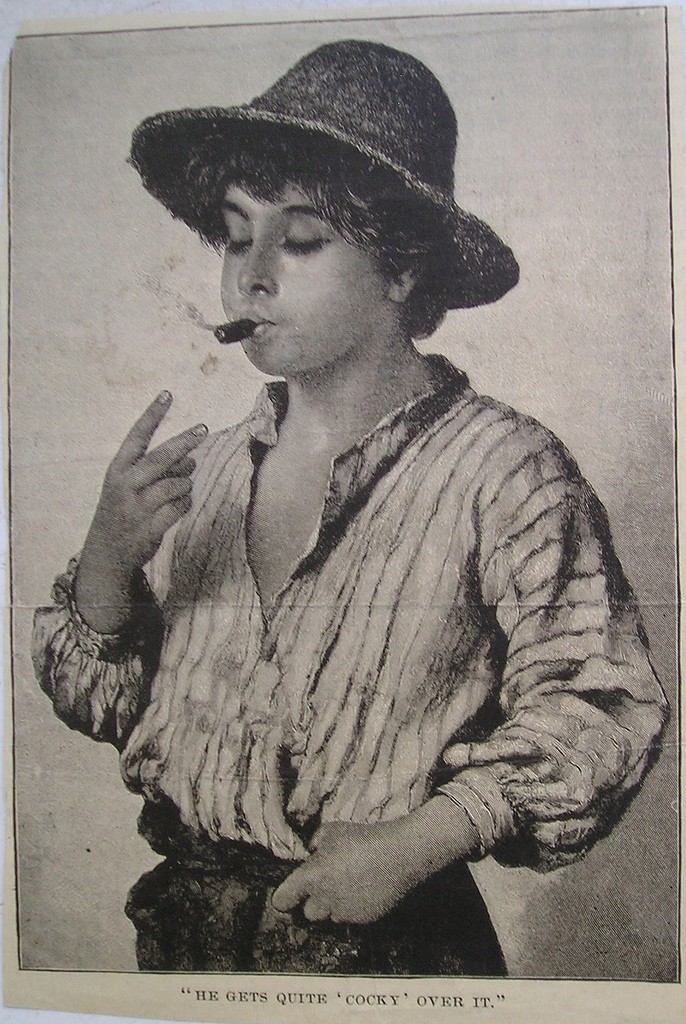
Edith Zimmerman, at age 14
It was 1997, in Cambridge. I was with a friend and we were walking along the train tracks on the way to see the re-release of The Little Mermaid. She had the cigarettes, but I don’t remember how she got them. I smoked two in a row and felt stoned out of my mind. Shortly after the previews, I got up and barfed twice — I made it to the bathroom but not quite the toilet. Then, instead of going back into the theater, I called my mom from a pay phone to see if she could come get us. My friend, who helped me clean up and never complained about any of this, sprayed me with peach perfume. I think I claimed food poisoning.
Diana Stojković, at age 13
It was a warm summer night in Bloomfield Hills, at my cousin’s dad’s house. I was hanging out with my older cousin, who was fifteen. Her dad was fast asleep — we waited until we heard him snoring — then we quietly opened a window in the living room. It was this old window, so we had to be careful it didn’t make noise. We snuck out onto their deck. It was very dark, so we were keeping quiet, whispering. She pulled two out of a pack, handed me one. I couldn’t see anything. She lit it for me, then lit hers, and said, “this is how.” I followed her lead and started coughing immediately, and tried to stifle it, and she said, “Shhh! He’ll wake up!” After a couple more puffs, I felt something in my mouth, little pieces of stuff. She brought her lighter close to see, and we’d lit my cigarette the wrong way, filter first. I’d been smoking it backwards.
Peter Sullivan, at age 13
I can’t really remember my motivations. I think it was part of the angsty teenage rebellion deal. There wasn’t as much of a stigma to cigarette smoking in ’94, but it was definitely frowned upon. But I think I was more interested in doing something new than something bad. So one day, my friend stole some cigarettes from his grandpa, I think More brand. And we were in my basement, which had a door open to outside, but was also next to the furnace, so when we smoked, it filled the house. Of course my parents were home, so my dad came down and, instead of telling us to stop or punishing us, he proceeded to list all the relatives I had that died of cancer. I remember him laughing, I assume at how terrible we were at not getting caught. I also got caught the first time I smoked pot, because I left the burnt marijuana out in the open in my room. Real genius here.

Mary H.K. Choi, at age 10
My friend Susana and I were latchkey kids growing up in Hong Kong. Our parents hung out together. She was affluent and had access to her dad’s duty-free Davidoffs. They’re jiggy — not Nat Sherman level or whatever — but I remember thinking there was a fanciness to the box. One day we were hanging out and she busted out the cigarettes. She grabbed a lighter, Fa spray deodorant — this was back when there were CFCs still in the shit — and we slinked into the stairwell to get away from her maid. She took a puff, and looked pretty good and then took a puff. I was cool enough that I inhaled properly and was completely chilling, but then Susana panicked and sprayed the deodorant to cover the smell and it hit my mouth. I barfed. It was all about Marlboro light 100s after that. They made my fingers look so skinny.
Matt Dorsey, at age 9
This was late 70s. I was enjoying a summer day at the pool at my uncle’s house when my dad — who’d continue to smoke two packs of Marlboro Reds a day until his last years — had finished a cigarette, threw the butt into the grass, and walked away. Curious, I snuck to the still-smoking butt, picked it up, and put it in my mouth. Before I could make any sense of it, my mother screamed from the porch and ran to me, grabbed my arm, and dragged me inside where she pulled a pack from her purse. She sat me down, put a cigarette in my mouth, and lit it. She was furious. Scared, I began to blow through the cigarette. She said, “No! Suck in, like a straw!” which I did, and immediately choked and coughed all the way to the bathroom, where I drank water from the sink like my throat was on fire. It worked. I didn’t smoke another cigarette until college.
Rick Paulas smoked his first cigarette in college because his dorm mates would always go outside late in the night, and he was bored, didn’t want to miss out on good conversation, and it felt narc-ey in some vague way to go out there into the magic of the smoker’s circle without being also being one.
How Your Porn Parodies Get Made: A Colloquy
Does data science have anything to do with it?

[The news of a forthcoming pornographic adaptation of the most culturally significant work of art in our species’ history — “Hamiltoe will be revolutionary. It will be the first hip-hop porn musical spoofing a Broadway show, celebrating a historical figure. And it will have anal sex,” — raises many questions, some of which are discussed below. Note: This transcript has been condensed and edited for clarity.]
Silvia: “The Inevitable Hamilton Porn Parody Is Coming”
Balk: Now it’s over
Mike: Wait, they did one about “Adventure Time”? What the heck?
Balk: Somewhere there is a data scientist whose job it is to determine whether or not something has enough currency to make it viable financially or publicity-wise to do a porn parody of whatever is currently buzzy.
Adam: I think you’re giving the folks at Woodrocket too much credit there, Balk. I am fairly certain they do not employ any type of scientist, data or otherwise.
Balk: Adam, we know most technological innovation comes from porn, why wouldn’t data science follow those rules?
Adam: I’m just saying I don’t think it takes someone with a Ph.D. to say “Hamilton is popular.”
Balk: Sure, in your East Coast liberal bubble it seems obvious. But do the jack-offers of the American Midwest know enough about it to spend their hard-earned splooge budget on it? How much of that Southern jizz dollar is going to go toward Hamilton porn? Would the wankspankers of the Plains states prefer to toss their dollars this way or at something more accessible, like “Fuller House”? This is the kind of thing you need real metrics to decide.
Do you have any inside knowledge to contribute to the discussion? Please join the conversation!
Good News: Nobody Writes Bad Books Anymore
The critics agree, it’s a terrific time for literature.
Younger readers may not remember this, but back in 2003 it was so difficult for authors to get a fair shake that a few people started a magazine predicated on the idea that book critics were way too mean and wouldn’t it be great if everyone could say nice things about books and keep their snark to themselves?
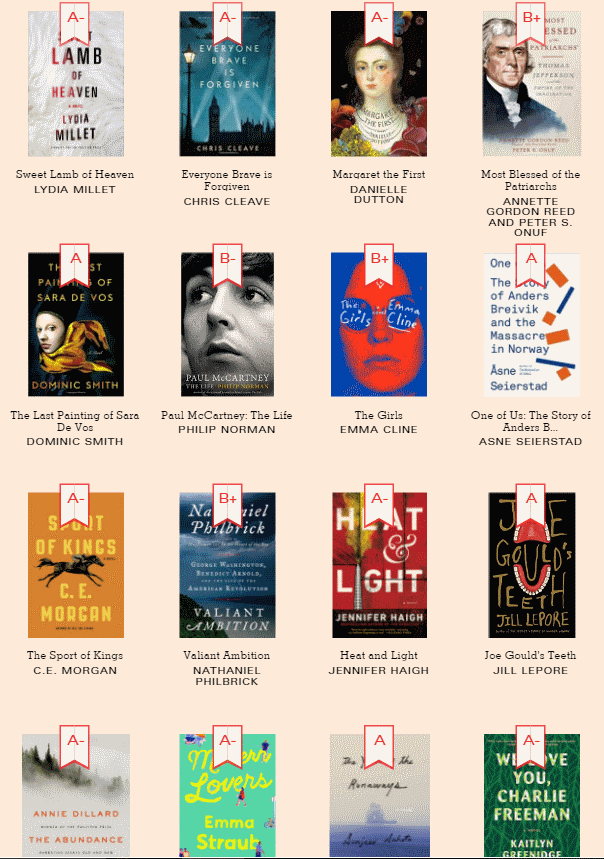
Cut to the current day, when we can see that, according to Book Marks — Lit Hub’s new “Rotten Tomatoes” for books — this plea did not fall on deaf ears, and the beautiful future for which those dreamers hoped wound up being the world in which we live. Everything’s great! I hope we all realize how happy we should be.
Ice Cream is Ruining My Summer
Surviving the weather, the internet, and pants.
“Hey, man, I love ice cream. But trying to scoop the ice cream out of the little pint carton is practically impossible. What can I do?” — Impatient Steve

Häagen-Dazs is pretend Danish for “Concrete.” I’ve met Ben and Jerry, if those are their real names. They did not like my idea for a flavor. It was to be called “O Captain My Captain.” And would have been vanilla ice cream with Cap’n Crunch frozen in it. OK, that’s cool, Ben and Jerry. They’re communists, they didn’t want to make any money for some reason. They want other ice cream companies to make tons of money. It’s some kind of redistribution of ice cream wealth that they’re after. And now they’ve sold out to Unilever. So who’s laughing now, Jerry and Ben? Dutch people, probably. And makers of spoons. The spoon industry does very well because of their ice cement. All of my spoons are completely bent backwards because of their insane frozen mindfuckery.
I don’t know who decided that ice cream ought to be as hard as a rock and impossible to scoop for like half an hour after you take it out of the freezer. When I take ice cream out of the freezer I want to be able to eat it right that second. Not like an hour later. This is America. Not North of the Wall, in the frozen wastelands. When I was a kid, there was only one kind of ice cream. It was made by Breyer’s and it was vanilla. And we liked it. We took it out of the freezer and ate it immediately. It did not bend spoons like some kind of bewitched ice nightmare. Sure, it had some air blown through it. We did not mind the air. Air is good.
My first advice is that Häagen-Dazs and Ben and Jerry’s should change their packaging. I’ve been mulling it over and I’m undecided between having it pre-scooped in a bag like those Pod bags detergents use. Or, even better, those Pod detergent boxes. Imagine 50 perfect scoops just waiting to be pulled out and immediately enjoyed. Pint cartons are too small an amount of ice cream, anyway. Also possible that ice cream should come in cubes, I am working on this presentation and it’s a mess so far. But a promising mess.
I don’t know about the rest of ice cream eaters. But on Friday nights while I’m watching True Crime stuff on TV, I do not yearn for human companionship. That’s what those True Crime shows on TV are there to remind us of on Friday nights when we’re alone and always will be. Most people are murdered by the people they’re in relationships with. According to TV, being in a relationship with someone usually ends in death. I don’t want to be killed at all. I fear death and I fear intimacy. I’m pretty sure if I let someone in they would kill me and put letters under my fingernails.
My advice for you, Steve, is to stay single. And also cut that pint-sized ice cream right down the middle with the biggest knife in your kitchen. Put it upside-down on your cutting block and just hack it in half. You don’t have to play the sick mind games of ice cream makers. You don’t have to wait to be murdered by the people you love. It’s your world! This is your life, Steve. This is still America.

“I made fun of someone on the internet like 10 years ago and they’ve made it the full thrust of their life to destroy me and my online business. What should I do?” — In Trouble on The Internet

Just like the internet is forever, so is the shame that the internet can bring us. That is forever, that never goes away, no matter what. I agreed to let someone do an article about me in the Village Voice a decade ago. They sent over a photographer. It all started rather normally. I was wearing a shirt and pants at the beginning of the session. But they took photos for hours and having your photo taken is a weird experience. One minute you have pants on, and the next you’re in your underpants pouring Lucky Charms over your nipples.
So the resulting photo of me that was on the Village Voice site is me in my underpants, acrylic painted heart on my chest, Spiderman bedsheet tied around my neck like a superhero cape. It is a damned handsome photo of me. But one that comes up when you google me and did come up when a job I applied for and then didn’t get. I will basically work in bookstores for the rest of my life or until people stop reading books, around 2019.
Am I vengefully angry at the photographer or the Village Voice? Hell, no. Well played, all. I am not capable of decades-long obsessive anger. I mean, who gives a crap? I’ve made fun of millions of poets since the beginning of the internet. I know that some day they will all have their revenge on me. That’s how the internet works. You publish my sex tape, I sue you for $140 million. I’ve read those French revenge novels and seen those Korean revenge movies. Revenge never pays off, it always leaves you masked in the Bastille and later hypnotized and sleeping with your daughter somehow. And no one wants that. That is a bummer.
I used to think of the internet as an endless game of bumper cars. We do not bump people in bumper cars because we hate them. It helps, but is not necessary. We bump because that’s what people on the internet do. We’re all insecure and surprisingly sensitive. The internet amplifies this. And stores it forever. But, like poets, nothing we truly do matters. Money is an illusion. Fame is fleeting. And you’re but one tiny person in the universe. Who told you you could be so angry forever about some article on the internet no one really cared about?
There’s nothing much you can do if people you’ve written about want to spend the rest of their lives trying to destroy you. Chances are, they will lose interest after a few decades. Or something else terrible will happen to them that will be fixated on that for a while. You could stop making fun of people on the internet, but that’s too much fun and you are just too good at it.

“I am told that men should not wear shorts during the summer. Is this true?” — Hot Harry

You’re a man, Harry. And if you feel like wearing shorts in the summer, you should definitely do that. I’m not big on shorts because I really want to save my calves for the people I’m intimate with. My calves are one of my sexiest parts, next to my elbows, which are hawt. I am trying to create a pair of long pants with hidden vents for people who don’t like showing off their legs but want to stay cool during the summer. But I am not a tailor and all I’ve done is make a giant mess. Melted ice cream cubes and scissored pants everywhere. But I am working on it! Stay tuned!
Jim Behrle lives in Jersey City, NJ and works at a bookstore.
Perfume Advert, "Mirror Shield"
I have a lot of thoughts on how dumb everything is an how terrible the people responsible for it are, but the sun is shining and all the evidence so far shows that nothing stops the terrible — in fact, it only gets worse — so for now let’s just sit back and listen to some music. There’ll be plenty of time to talk about the terrible later. Oh, speaking of music and the few things that are not terrible, Tom Breihan’s piece on the [KILL ME] 20th anniversary of Belle and Sebastian’s Tigermilk is terrific, you should read it. Enjoy.
New York City, June 5, 2016

★★★★ The daylight came up weakly and slowly, like a muffled and ignorable alarm clock. The four-year-old had a fever and would not be going to the scheduled birthday party. The clouds redarkened and a fine blowing rain came, then a blinding white downpour, right when the four- and newly five-year-olds were supposed to have been out on the Intrepid. The blinding white downpour ended and left a blinding white fog. Even as the afternoon seemed to brighten again, the fog clung to the tops of the towers by the river. Neither opening nor closing the windows could dispel the stuffiness. The dryer beeped and beeped, choking on wet lint. A mango delivered from the chill of the grocery truck was slick with condensation. Bacon sweated fat in the pan and the face minding the bacon sweated sympathetically. The wind cut through the part-opened blinds with the harsh startling buzz of a too-large insect. A moment later the building started moaning, and in a few more moments rain hit the windows hard. Soon sheets of it were slamming into the glass, over and over, with such violence that what might have been a rumble of thunder reached the ears as an afterthought. The storm rushed away as abruptly as it had come on, and then, after a gray interlude, the sun came on as shockingly as the rain had—in dazzling clear beams, bouncing from window to window, or setting a glow to things scattered throughout the darkened landscape: individual building faces way off in New Jersey, tree branches down on 70th Street, orange construction mesh in the heights of new construction downriver. The whole west was blurry and luminous, with colors superimposed and bleeding through one another, and through the shapeless brightness, little clouds like white jellyfish went trailing northward. More and more clouds passed, in every available color and illumination, pink ones near and silver ones far, and dark purple ones after. Magenta ridges ran along the bottom of the westernmost surviving stratus. The last daylight stayed and stayed, liberated and still mutating, through lemon into blue and on into subtle browns. The illuminated interiors of the apartments, one after another across the building faces, seemed to imitate the fragmented and changing glow above. Out in the night, after full darkness had come, every few feet along the planters carried the slightly different smell of different vegetation charged and battered by the rain. In the lamplight, the new-sprung tips of the evergreen trees were as pale as paper.
Get Your Profile On
‘Tim and Eric’ in Bloomberg Businessweek

Max Abelson takes a close look at the history of the Tim and Eric empire, all the way back to Heidecker and Wareheim’s college days at Temple University, and their time as event videographers in Philly:
Before graduating, they drove a van to Los Angeles and got Hollywood internships. Things didn’t go well. They lived in a Burbank building filled with child actors who’d moved out West to make it big. “It was us and these kids … ,” Wareheim says, sounding spooked. They moved back East. While Heidecker lived in New York, Wareheim shot wedding and bar mitzvah videos in Philadelphia. The bad part was bumping into people he knew from school while wearing a silky tuxedo shirt; the good part was being allowed behind the scenes with high-strung families feeling pressured to look their best while seething behind tight smiles. On days off, the two tapped that deep discomfort for the videos they made together.
Now, their production company, Abso Lutely, is making successful low-budget comedy in the midst of a TV bubble. How?
Tim and Eric are figuring out a new method of comedy production. Depending on which subreddit stream you’re reading, they’re either geniuses or pointlessly nihilistic and digressive. But their ability to pump out content — from their Super Bowl advertisement for Loctite superglue to 15-minute segments of Check It Out! — while enticing household comedy names to make cameos is allowing their fiefdom to grow.
Read the whole thing.
Enlightenment For Less
The strange koans on Trisonic’s 99-cent-store products.

“Greed not only brings misery, it may also bring ruin.” This is a fair point, but it’s a bit strange to hear from a package of plastic hanging hooks at the 99-cent store. There it is, though, tucked between the large “HOUSEWARE” and the smaller “©Copyright. All Rights Reserved,” a few inches below big red Trisonic brand name. Scan the shelves for other Trisonic wares, and you’ll notice that each has a gnomic quote.
Bland and vaguely technocratic, Trisonic is the perfect name for a dollar store brand. It’s slightly off in an unplaceable way, like the fictional stand-in for a real-world counterpart. The philosophical quotes on their packages are similarly inconspicuous. They’re not concealed like the “John 3:16” on In & Out cups and wrappers, but hidden in plain sight, no different from the part of the label that the eye glosses over like a display ad.
Some of the quotes are pretty standard. “People are wrong to focus narrowly on themselves.” Others are more ominous: “A kind heart enjoys heavenly bliss; an evil mind experiences hell.” Some sound like something out of a Peter Handke novel: “As you become more detached from the world, rather than denying your humanity, you become more humane.” Occasionally they’re in all-caps, like a stray Jenny Holzer piece: “THE BUSY MAKE THE MOST OF TIME. THE DILIGENT ENJOY THE BEST OF HEALTH.”

In Ann Beattie’s fantastic 2010 novella, Walks with Men, a young writer in New York City is given advice by an older man, her mentor-cum-boyfriend: “purchasing only the finest brands or shopping at thrift stores was the only way to acquire things — anything in between was bourgeois and pathetic.” I was raised with the exact opposite attitude: a good sale is always worth perusing, and shopping was as a pastime. If we had to kill half an hour, my mother would take me to TJ Maxx — I have fond memories of searching for 80% off Volcom shirts. Today, when I’m feeling wistful, I go to the store.
Like most people I know, I feel wistful a lot. I find myself planning entire afternoons around stores: “If I walk to the bookstore in Crown Heights, I can hit Modell’s, French Garment Cleaners, and Home Depot on the way home.” But I can only buy so many paperbacks and light jackets and houseplants. I return home with nothing to show for my afternoon and a few less hours in my life. I used to joke that I was working on a memoir called, By Design Within Reach I Sat Down and Wept.
99-cent stores in New York City are an under-appreciated refuge. Those who don’t ignore them entirely tend to think of variety stores as lesser Duane Reades. But these mini bazaars are much more than a place to buy expired batteries in a pinch. Thousands of products, from plates to shelving to lightbulbs to pregnancy tests (apparently, these are an especially good deal) are crowded under one roof, selling for a fraction of their standard prices.
There are a few ways that products end up in discount stores: some are bought on closeout from retailers, or on the gray market, and some are just normal products, sold as they would be at any other store. But there are also generally adequate products designed specifically for discount stores. If you’re in the silent majority who needs to use a screwdriver three times a year, they’ll do just fine. Trisonic dominates that market, producing a wide and seemingly arbitrary selection of wares, like kitchen knives and lightbulbs and dog collars and shelving support.

There’s a Village Voice article from 2012 titled “18 Pieces of Bizarre, Paternalistic Advice from a Chinese Hardware Company’s Packaging.” This glib reaction seems wrong; Trisonic’s products are made in China, but the company is based in Flushing, New York. The advice isn’t bizarre, it’s just weird that it’s on a box of screws. I suppose it’s paternalistic, but what advice isn’t?
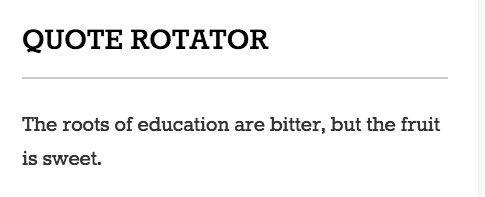
It’s not like I defend the quotes as gospel, though they do generally seem like good ideas. I appreciate them as a sort of literature, like a line from a billboard in a place I’ll never visit. They have an ESL quality that turns hackneyed sentiments into something clunkier; the inelegant grammar forces the reader to spend extra time parsing what the words actually mean. Common clichés are considered anew — Treat others as you would like to be treated becomes Whether or not you understand profound ideas, it is important to be a good person wherever you are now.
A lot of the quotes are about forgiveness and kindness. I love the idea that someone may read a tape measure box and decide to forgive me for something. Many of the quotes come from Cheng Yen, a Taiwanese Buddhist nun. I found one from Plato, and many seemed to be from the Dalai Lama. I began to wonder if Trisonic was secretly propagating a religious movement.
On Trisonic’s website, there were no answers on the F.A.Q. page. Alongside a quote rotator was something of an explanation:
“When you buy a product or go into a store what is your purpose for going into the store? Typically we have noticed much too often that people go into a store to just buy some tool, headset or party accessories and we thought that is good that people can do that but the product can be more than just a product. . . The reasoning behind these quotes are that our company is not just a company that creates products we also believe in how, as a company, we are part of the community and that the products are part of our daily lives.”
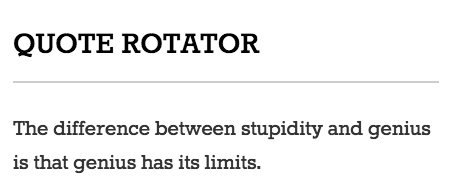
There was a 718 phone number listed in the contact section. I called and was transferred to Michael, a brusque but kind man with a Queens accent. I told him I was looking to find out more about the quotes on his products.
“What about them?” he asked, as if there was nothing at all unusual about the practice.

I told him I’d never really seen a company do anything like it.
“Yeah, a lot of people like it very much.”
That’s good. As the triplex jack phone adapter says, the purpose of our life is happiness. But are the quotes a religious thing?
“We really don’t want it to be religious because it could offend some people.”
He told me the practice of putting philosophical quotes on the packages started “probably seven or eight years ago,” and that there wasn’t necessarily any thought given to which quote goes on what product — the nightlight that I’d seen with a quote about dreams was probably just a coincidence. I asked if he could explain in more depth, but he just said, “we decided that, when people look at packaging, they want to know more than just what’s on the package.” It was a vague answer, but probably the truth. He seemed eager to get back to work, so I let him go.
I spent a week wondering if Trisonic was being intentionally mysterious, or if I’m just very bad at asking questions. One must overcome difficulties, not be overcome by them, I thought. A confused mind suffers agony; an enlightened mind feels at ease. I called them back. Again I was transferred to Michael. Previously curt, he now had the demeanor of a downtown traffic cop.
“I’m very, very busy.”
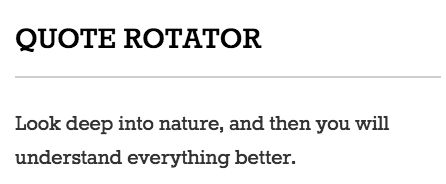
During our previous phone call, he had told me that he wasn’t the person who’d come up with the idea of putting quotes on Trisonic products. Maybe he could tell me who had come up with the idea?
“No.”
Could he perhaps tell me more about why not?
“No.”
Maybe they would prefer that the quotes seem to be coming from Trisonic as a brand, and not an individual?
“Yes. Okay next, what’s the next question? I’m very, very busy, so I don’t have time for this.”
I did not repeat the lesson from the 4” cutting wheel for metal, Share your knowledge. It’s a way to achieve immortality. Instead I asked if there’s a reason that the quotes appear on the packaging without attribution to their original speaker.
“No,” Michael said as he hung up on me.

Forgive those who unintentionally hurt us.
I’d originally expected that Trisonic would be eager to discuss their philosophical leanings. At the very least, I thought I’d get a boilerplate PR message. Instead, Michael just wanted to get off the phone. People are wrong to focus narrowly on themselves, I remembered from the nitrogen bulb package. A solipsist, I’d interrupted his day — twice — with the expectation that he’d want to talk to me.
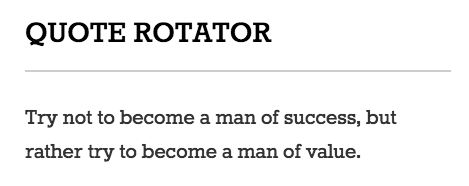
Michael may have been strangely cryptic, but I’m pretty sure he’s telling the truth. Trisonic’s spiritually enlightened packaging probably isn’t a religious conspiracy or a diabolical marketing ploy. Someone just thought customers would appreciate it if packaging had wise words to offer, like a fortune cookie for home goods. And why not?
Thousands of candles can be lighted from a single candle, and the life of the candle will not be shortened. Happiness never decreases by being shared.
Hanson O’Haver is a writer living in Brooklyn. Follow him on Twitter: @hansonohaver
The Business Manual For The Surrendered Wife
An excerpt from Chris Lehmann’s ‘The Money Cult’
We are very happy to present the following adaptation from Awl pal Chris Lehmann’s The Money Cult: Capitalism, Christianity, and the Unmaking of the American Dream. A “sweeping and accessible history that traces American Christianity from John Winthrop to the rise of the Mormon Church to the triumph of Joel Osteen,” The Money Cult argues that “capitalism has always been entangled with religion, and so today’s megapastors aren’t an aberration–they’re as American as Benjamin Franklin.” Speaking of capitalism, here’s where you exchange your money for the book.
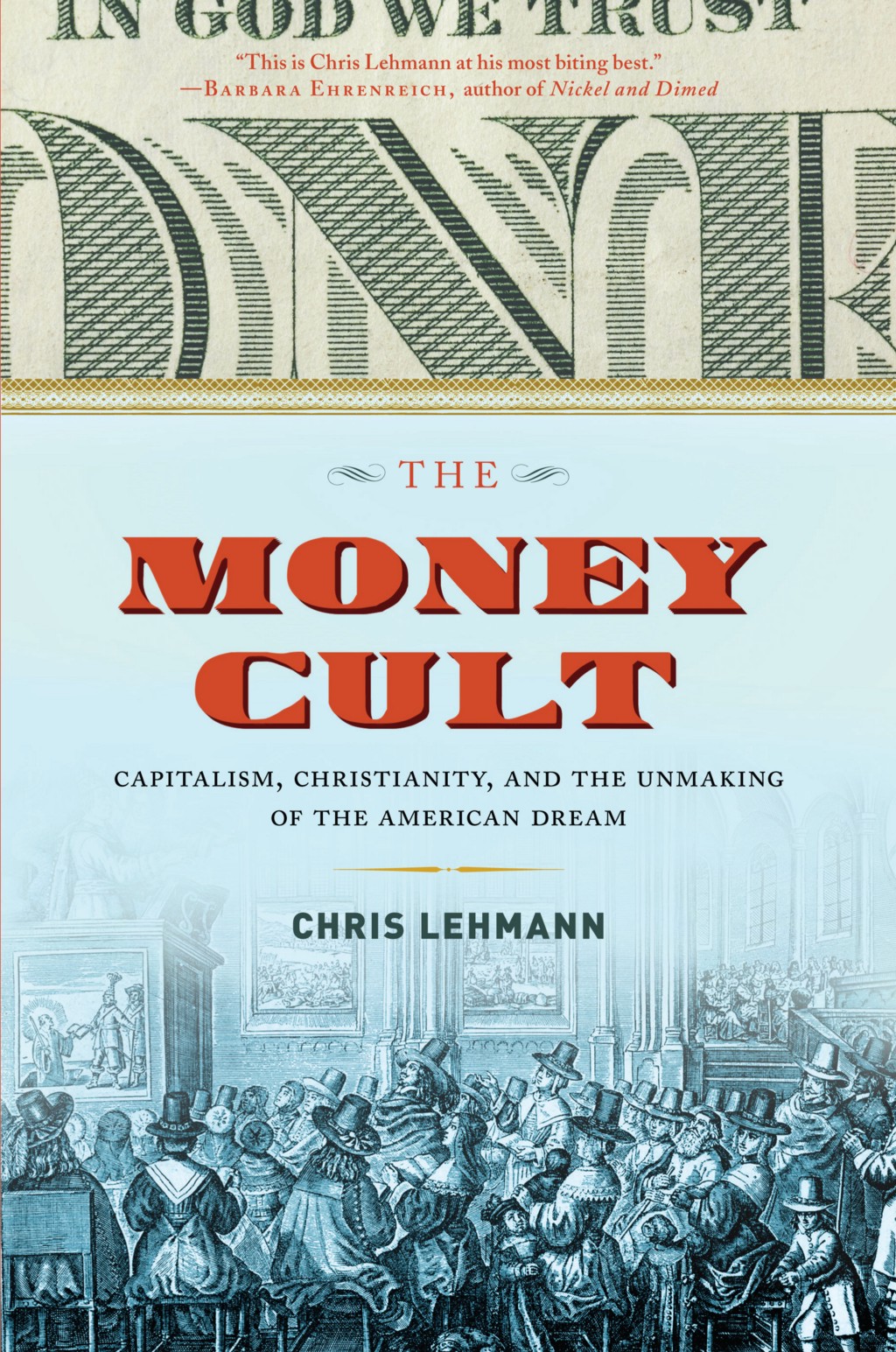
Family Values
Ever since the early nineteenth century, the main run of Protestant believers in America were women — a demographic trend that, if anything, made it all the more incumbent on the traditionally male leaders of the mainline Protestant world to defend and vindicate their own elevated standing. In other words, to be a faithful Protestant believer in America’s industrial age usually meant to embrace the spiritual authority of accomplished male leaders in the traditional alpha mode.
This all began to change during the seventies and eighties. As Bethany Moreton shows in her incisive study To Serve God and Wal-Mart, the overlapping economic crises of the seventies triggered a core re-evaluation of the innermost productive logic of the Protestant work ethic — and this revision would recast the gendered ideals of American labor in a new, evangelically tinged light. This pivotal shift took place under the mantle of a new management theory called servant leadership, and Moreton lays out its gender significance in sharp and suggestive terms:
During the 1970s and 1980s, the eclipse of production by the service economy heightened Christian fears that the wellsprings of American virility were drying up: where would real men develop if work came to look too much like home? How could male authority survive the ascendance of service work and the mobilization of women as wage earners? The experience of service labor itself offered the basis for a new ideology that met these challenges. Christened ‘servant leadership’ by its formal adherents, this new ethic glorified the formerly humble, feminine reproductive labor against which the old manly producerism had defined itself. Taken up by Christian opinion-makers and embraced by many families in the pews, servant leadership offered something to everyone. Service workers found a measure of respect denied them by the heroic narratives of industry. Managers gained a new claim to authority just as their older ones came to look increasingly implausible. Christian husbands enhanced their status at home despite the loss of the bread-winner’s mantle. And many evangelical women found wifely ‘submission’ a small price to pay for men’s reinvestment in the domestic sphere.
In this new dispensation, evangelical women were to benefit rhetorically from Second Wave feminist calls for greater recognition of their labor and selfless service, while also claiming for themselves a notional equality of parental authority. But it was also taken for granted in the servant-led household that all the adult parties must cleave to the traditional biblical teaching of wifely submission within the power dynamics of married life. Self-help books such as Marabel Morgan’s The Total Woman — which clocked in as the bestselling nonfiction book of 1974 with more than 10 million copies sold — brimmed with modern tips for reviving a marriage’s flagging sexual momentum. (Morgan won a great deal of titillated media renown for advising women to surprise their husbands as they returned at the end of the workday by greeting them at the door clad in nothing but Saran wrap.)
Morgan’s sunny celebration of the erotic charges to be won from the surrendered wife’s confinement in the domestic sphere was not merely an exhortation for her readers to take traditional male authority at face value. In her alliterative four-point scheme of successful marital submission — “Accept Him,” “Admire Him,” “Adapt to Him,” and “Appreciate Him” — Morgan seamlessly takes up the rhetoric of service management in the context of the more intimate marital challenges of optimizing sexual and emotional self-expression and shoring up a partner’s self-esteem.
For all the heavy-breathing attention it won in the mainstream press for its sexual counsel, The Total Woman was at bottom a domestic business manual. Its first chapter, “The Organization Woman,” directed unhappy wives to conquer their sense of creeping marital stagnation and malaise with a battery of to-do lists, prioritizing undone domestic chores while also freeing up time for self-pampering in front of the vanity and dramatic seduction scenes at the end of a frazzled husband’s workday. Morgan dubbed this regimen “Your $25,000 Plan,” since it stemmed from a piece of managerial folklore in which steel-and-investment titan Charles Schwab rewarded a female management consultant with that sum for presenting him with a simple system for prioritizing the tasks of his workday. “If it works in a steel factory,” Morgan wrote, “it will work for you in your house factory.”
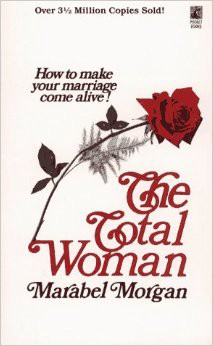
To judge by Morgan’s wildly successful counsel, enterprising and ambitious women were finding that the challenge of navigating a traditionally patriarchal marriage had turned out to be a lot like the challenge of preserving one’s self-worth and dignity in the far more impersonal realm of the market. And much like the bureaucracy of the postindustrial workplace, the family unit usually relies to an inordinate degree on the junior executive’s superior initiative to jump-start the more constitutionally sluggish energies of company leadership. It’s true, Morgan conceded, that it can be exasperating for the wife in a traditional marriage to be continually initiating the rituals of emotional appreciation and admiration demanded by the breadwinner spouse. But that outlook changes once women can “see they have certain strengths that a man doesn’t have. It’s a great strength, not a weakness, to give for the sake of giving. It is in your nature to give.”
The Total Woman abounds with reminders that the female partner in marriage, while subordinate in executive authority, possesses the greater hands-on qualities of servant leadership. While their rigid, achievement-minded spouses are often emotionally inaccessible or unable to adopt more flexible views of their roles in the home and workplace, women are able to make marriages and the men in them “come alive” — as the book’s subtitle had it — with the power of their faith. As Morgan explains, you, the emotional manager of the domestic sphere, “have the power to lift your family’s spirit or bring it down to rock bottom.”
And like any service-minded superhero, the Total Woman is charged ultimately with using her powers for good: When the nominal family president’s self-esteem appears to be waning, the task is simple: “put his tattered ego back together with compliments.” Very much in contrast to the self-improving spirit of the nineteenth century’s evangelical revolution, the Total Woman gospel is largely a great project of emotional and sexual reclamation — to undo, with the miraculous power of emotionally engaged female faith, the abrasive damage wrought upon the fragile male ego by the impersonal rounds of market competition and its drastically diminishing returns.
The tremendous success of Morgan’s self-help tract launched a thriving cottage industry in marriage and intimacy manuals for evangelical readers. In 1976, Tim and Beverly LaHaye issued The Act of Marriage, a sex-advice guide for Christian couples, which also teemed with surprisingly straightforward, informative, and quasi-clinical discussions of the act in question; it sold more than 2.5 million copies — and unlike Morgan’s book, remains in print today. Beverly LaHaye followed soon thereafter with The Spirit-Controlled Woman, her own tract laying out the many dynamic and erotic charges that women can bring to conventionally patriarchal unions.
In Fascinating Womanhood, meanwhile — originally published in 1964, but reissued in 1975 to capitalize on the exploding evangelical market for marriage-advice books — Helen Andelin made the demands of the market-wounded vanity of men even more explicit, in a list of the typical husband’s essential “needs”:
1. His need to be accepted at face value;
2. His need for admiration;
3. His sensitive masculine pride;
4. His need for sympathetic understanding;
5. His need to be No. 1;
6. His need to serve as the guide, protector, and provider; to feel needed in this role, and to excel women in doing so.
In the wake of the Total Woman craze, media commentators and religious figures alike spent a great deal of time debating the ongoing challenge of squaring conventional evangelical piety with the more unvarnished demands for gender equality, in the domestic sphere and the workforce alike, coming from the women’s liberation movement. Meanwhile, the women on the evangelical side of the divide in this foundational moment in American cultural warfare were, of course, hardy tribunes of “family values.”
But to dwell obsessively on this familiar pitched battle over feminist right and family obligation — choice versus submission, self-assertion over caregiving, career in opposition to “family” — as our culture has now for the better part of half a century, is to miss at least half of the picture. For as the testimony of Marabel Morgan and her cohort of defenders of evangelical womanhood made abundantly clear, they didn’t see any contradictions between liberal individualist choice and the more mutual obligations of family life. If anything, their vision of the family was cribbed to a strikingly self-conscious degree from the psychological mandates of advancement within corporate America.
In reorganizing evangelical families, the insurgent Total Women of the seventies were cannily spiritualizing the routines of a domestic sphere already groaning under the logic of market domination — just as the former Episcopalian priest Richard Bolles — author of the mega-bestselling job-seekers’ manual What Color Is Your Parachute? — was retooling the stigmatized and shame-inducing experience of unemployment along softer-focus lines of a divinely sanctioned moment of redemption in the career-long unfolding of the job seeker’s human potential.
A new chapter was beginning in the odyssey of the Protestant ethic — and its posture toward the world of capitalist enterprise was now paradoxically suffused in joy. Far from transforming working and professional life into a vast, edifying spiritual quest, the revolution in the seventies and eighties political economy of the spirit turned the formerly market-resistant preserves of personal life into a long succession of jobs, that one had to apply for over and over again.
Chris Lehmann’s ‘The Money Cult’ is out now. There’s a launch party this Thursday at the Melville House Bookshop in Dumbo.
Band Of Horses , "Whatever, Wherever"

The Fiction Issue is my favorite issue of The New Yorker because I don’t give a shit about fiction and it lasts for two weeks, so for 14 amazing days I can walk around with the serene air of someone who is completely on top of their periodical game. There’s a gleam in my eye, a spring in my step, and the hint of a confident — bordering on smug — smile playing at the corners of my mouth. (My dream is that they give us a week off after The Style Issue too, but then I might become unstoppable.) As of this morning, we have 7 more days until there is a new New Yorker, so I just want to remind you that everything ends and you should be sure to use your free time wisely while you still have it. Anyway, here’s another one from the forthcoming Band of Horses record. Something I have noticed about this album: These songs are much better on the second listen. Like, they’re not bad the first time around but they are noticeably more enjoyable when you hear them again. (See also.) So give this one a spin and then come back to it tomorrow. You’ve got plenty of time, it’s not like you’ve got a new New Yorker to get through. Enjoy.
